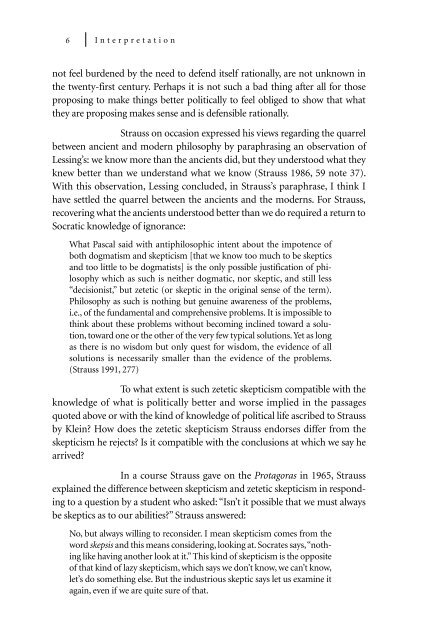Beyond Struggle and Power: Heidegger's Secret ... - Interpretation
Beyond Struggle and Power: Heidegger's Secret ... - Interpretation
Beyond Struggle and Power: Heidegger's Secret ... - Interpretation
Create successful ePaper yourself
Turn your PDF publications into a flip-book with our unique Google optimized e-Paper software.
6 <strong>Interpretation</strong><br />
not feel burdened by the need to defend itself rationally, are not unknown in<br />
the twenty-first century. Perhaps it is not such a bad thing after all for those<br />
proposing to make things better politically to feel obliged to show that what<br />
they are proposing makes sense <strong>and</strong> is defensible rationally.<br />
Strauss on occasion expressed his views regarding the quarrel<br />
between ancient <strong>and</strong> modern philosophy by paraphrasing an observation of<br />
Lessing’s: we know more than the ancients did, but they understood what they<br />
knew better than we underst<strong>and</strong> what we know (Strauss 1986, 59 note 37).<br />
With this observation, Lessing concluded, in Strauss’s paraphrase, I think I<br />
have settled the quarrel between the ancients <strong>and</strong> the moderns. For Strauss,<br />
recovering what the ancients understood better than we do required a return to<br />
Socratic knowledge of ignorance:<br />
What Pascal said with antiphilosophic intent about the impotence of<br />
both dogmatism <strong>and</strong> skepticism [that we know too much to be skeptics<br />
<strong>and</strong> too little to be dogmatists] is the only possible justification of philosophy<br />
which as such is neither dogmatic, nor skeptic, <strong>and</strong> still less<br />
“decisionist,” but zetetic (or skeptic in the original sense of the term).<br />
Philosophy as such is nothing but genuine awareness of the problems,<br />
i.e., of the fundamental <strong>and</strong> comprehensive problems. It is impossible to<br />
think about these problems without becoming inclined toward a solution,<br />
toward one or the other of the very few typical solutions. Yet as long<br />
as there is no wisdom but only quest for wisdom, the evidence of all<br />
solutions is necessarily smaller than the evidence of the problems.<br />
(Strauss 1991, 277)<br />
To what extent is such zetetic skepticism compatible with the<br />
knowledge of what is politically better <strong>and</strong> worse implied in the passages<br />
quoted above or with the kind of knowledge of political life ascribed to Strauss<br />
by Klein? How does the zetetic skepticism Strauss endorses differ from the<br />
skepticism he rejects? Is it compatible with the conclusions at which we say he<br />
arrived?<br />
In a course Strauss gave on the Protagoras in 1965, Strauss<br />
explained the difference between skepticism <strong>and</strong> zetetic skepticism in responding<br />
to a question by a student who asked: “Isn’t it possible that we must always<br />
be skeptics as to our abilities?” Strauss answered:<br />
No, but always willing to reconsider. I mean skepticism comes from the<br />
word skepsis <strong>and</strong> this means considering, looking at. Socrates says,“nothing<br />
like having another look at it.” This kind of skepticism is the opposite<br />
of that kind of lazy skepticism, which says we don’t know, we can’t know,<br />
let’s do something else. But the industrious skeptic says let us examine it<br />
again, even if we are quite sure of that.
















